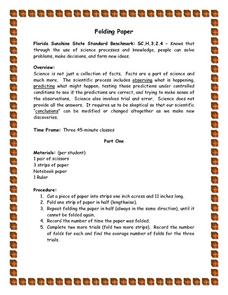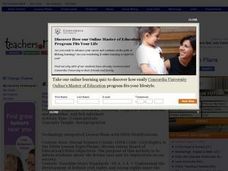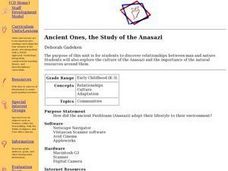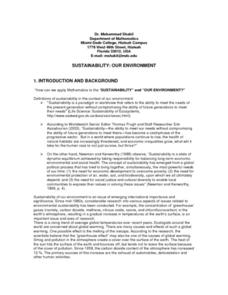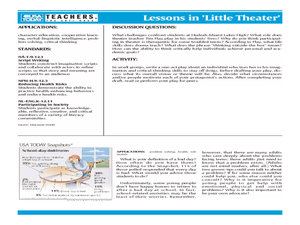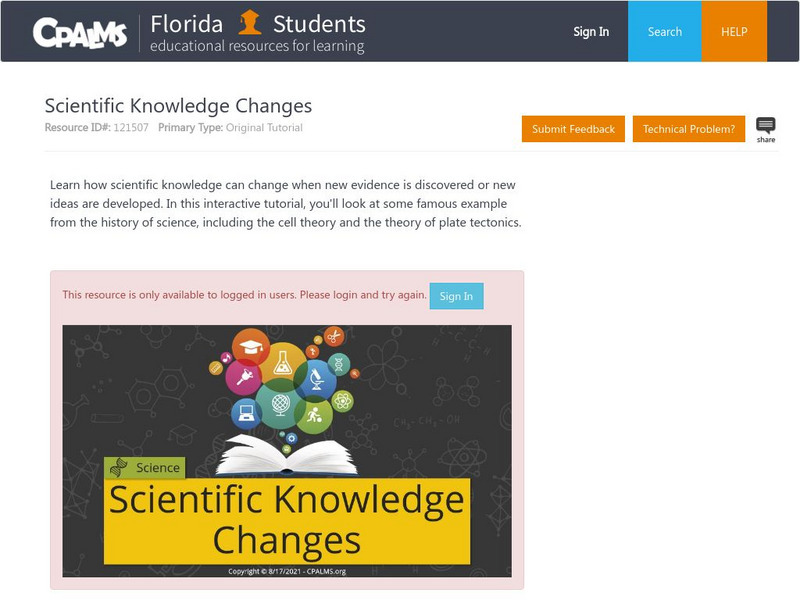Curated OER
Dolphins
Students investigate dolphins. They complete a Webquest, explore various websites, listen to audio clips of dolphin sounds, play an online puzzle game, answer discussion questions, and read and evaluate newspaper articles about...
Curated OER
Color Me Hot
Seventh graders use the scientific method, to observe, record and analyze the data they gathered. They make observations using their five senses. Students compare, contrast and draw conclusions based on the observations and data...
Curated OER
Floods: Rising Waters and You
High schoolers examine the relationship between human-made structures, flood waters and the increasing population through video clips, websites and a lab experiment.
Curated OER
Life on the Edge: Exploring Deep Ocean Habitats Cool Corals
Students research the basic morphology of Lophelia corals and polyps to determine the significance of these organisms. They detail the reasons that biological communities are focusing on the Lophelia corals as major conservation efforts.
Curated OER
Wildlife Preservers
Learners research endangered animal species and how they might be preserved by writing speeches to present to classmates.
Curated OER
Drop in the Bucket
Students study the sources for the water they use. They determine their town's major water supply and how many gallons per day does the population use.
Curated OER
Volcanoes: How Safe Are They?
Students explore the most dangerous volcanoes on Earth, plot their locations, and research different volcanic hazards.
Curated OER
AUSTRALIA
Students examine the different types of barrier reefs and how they are formed. In this barrier reef lesson students complete several activities on coral reefs.
Curated OER
Sinking in the Rain (or Drought)
Second graders, in groups, explore sinkholes and how they effect humans and the natural environment.
Curated OER
Plant Parts with Sequencing Cube
Third graders listen to the story, Jack's Garden by Henry Cole. They learn the parts of the plant by looking at live plants.
Curated OER
Superbugs
Students research deep sea communities and discover strategies for combating antimicrobial resistance and write reports on it. They consider overprescription and prophylactic uses of antibiotics as causes for their ineffectiveness.
Curated OER
Making Paper
Students create paper by adding a few small scraps of paper into the blender pitcher and adding just enough water to thoroughly soak paper.
Curated OER
Artificial Reef
Students conduct online research to determine how and why artificial reefs are created, and investigate how they benefit marine life and the marine ecology.
Curated OER
Watershed Island
Middle schoolers make a clay model and a geographic map of a watershed. They talk about the differences between the two representations and the potential human threats to watersheds.
Florida Center for Reading Research
Vocabulary: Word Meaning, Word Wrap
Support young learners' acquisition of new vocabulary with this pair of graphic organizers. Using context clues and reference materials, children complete each section of the activity, including the definition, synonyms, examples and...
Curated OER
Launching Rockets
Second graders discuss experiences of watching a rocket launch either on television or in person before making paper rockets. They make and color rockets which they attempt to launch using a strong breath blown through a straw at the...
Curated OER
Subtract Integers on a Number Line
In this subtracting integers on a number line practice worksheet, learners sharpen their problem solving skills as they solve 6 story problems.
Curated OER
Folding Paper
Students use the scientific process and their knowledge to obeserve, predict, and test their predictions under controlled conditions to verify their predictions and then make sense of these predictions. They also graph, write...
Curated OER
Brown v. Board
Pupils investigate Brown versus Board of Education. They read and discuss a handout, discuss vocabulary terms, and in small groups create a brochure, bookmark, puzzle, and a short skit.
Curated OER
Ancient Ones, the Study of the Anasazi
Young scholars explore relationships between man and nature. They examine the culture of the Anasazi and the importance of the natural resources around them. Students examine reasons for Anasazi people to leave this area.
Curated OER
Sustainability: Our Environment
Pupils explore the sustainability of our environment, the trend in rising temperatures and the emission of greenhouse cases. Using given data, students test and construct a confidence interval and the difference between two population...
Curated OER
Lessons in 'Little Theater' Echo in Students' Lives
Students explore the drama of real life. In this journalism lesson, students read the USA Today article titled "Lessons in 'Little Theater' Echo in Students' Lives," respond to discussion questions regarding the article, and complete an...
CPALMS
Florida State University Cpalms: Florida Students: Defining Science
Understand the scientific practices in this tutorial that defines what science is and isn't.
CPALMS
Florida State University Cpalms: Florida Students: Scientific Knowledge Changes
A slideshow tutorial will explain how scientific knowledge can change when new evidence is discovered or new ideas are developed. Take a step back in science history to see some great examples of how scientific knowledge has changed when...






